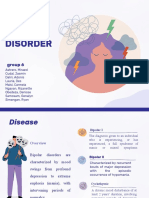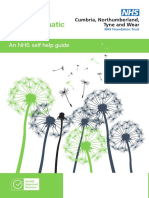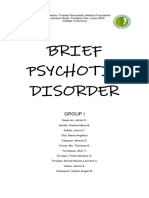Information Factsheet What Is Psychosis?: 2. False Beliefs
Information Factsheet What Is Psychosis?: 2. False Beliefs
Uploaded by
Grace LCopyright:
Available Formats
Information Factsheet What Is Psychosis?: 2. False Beliefs
Information Factsheet What Is Psychosis?: 2. False Beliefs
Uploaded by
Grace LOriginal Title
Copyright
Available Formats
Share this document
Did you find this document useful?
Is this content inappropriate?
Copyright:
Available Formats
Information Factsheet What Is Psychosis?: 2. False Beliefs
Information Factsheet What Is Psychosis?: 2. False Beliefs
Uploaded by
Grace LCopyright:
Available Formats
Information factsheet
What is psychosis?I
The word 'psychosis' is used to describe 2. False beliefs
experiences in which there has been some loss It is common for a person experiencing
of contact with reality. The person has difficulty psychosis to hold false beliefs known as
telling the difference between what is real and delusions. Delusions are fixed and firmly held
what is imaginary. It is quite common, 3 out of beliefs which others find strange. They are
every 100 people have an episode of psychosis different to beliefs the person would normally
at some point in their lives. have, based on their religious and cultural
beliefs. Often, a person is so convinced of their
Psychosis is associated with a number of delusion that even the most logical argument
different conditions which range from drug cannot persuade them to change their mind.
induced episodes to mental illnesses such as
schizophrenia, bipolar affective disorder (often 3. Hallucinations
called manic depression) and severe depression. In psychosis, a person's understanding of the
The experience depends on the individual and, world may also be affected. People may see,
to some extent, on the diagnosis with which it is hear, feel, smell or taste things that are not
associated. actually there. Auditory hallucinations, where a
person may hear voices which no one else can
It is very important to seek help as early as hear, or visual hallucinations, where a person
possible when psychosis or a relapse of sees things which are not there are, are the
psychosis is suspected. Therefore, it is important commonest. These experiences may become a
to know what psychosis is and how to recognise it. part of the person's delusional beliefs.
In this factsheet we describe some common 4. Changed feelings
psychotic experiences, how experiencing The way a person feels may change for no
psychosis might affect someone and useful ways apparent reason. They may feel strange and cut
of understanding psychosis. In an accompanying off from the world. Mood swings are also
factsheet we describe how psychosis can be common and they may feel unusually excited or
managed. depressed. A person's emotions can feel
dampened and they may show less emotion to
What are the symptoms? those around them.
Psychosis is an umbrella term for several types
of experience. In order to describe psychosis it is 5. Changed behaviour
useful to group together some of the more People with psychosis may behave differently
common experiences. It is important to from the way they usually do. They may be
remember that not everybody will have every extremely active or feel 'slowed up'. They may
experience. laugh inappropriately or become angry or upset
for no apparent reason. Often, changes in
1. Confused thinking behaviour are associated with psychotic
Everyday thoughts become confused and can experiences. For example, a person believing
become faster or slower than normal. A person they are in danger from a neighbour or
may have difficulty concentrating, following a organisation may call the police or someone who
conversation or remembering things. This can believes they are in some way special may
result in people not being able to understand spend the day preaching in the streets. Other
them. These symptoms are referred to as examples could include a person who stops
'thought disorder'. eating because they are concerned that the food
is poisoned or have trouble sleeping because
they are scared.
What is psychosis?
Sheet 2I
How are individuals affected? Some studies have found that psychotic
When a variety of these different symptoms are experiences run in families. Having a family
experienced, people may react in different ways: member who develops psychosis may mean that
other family members are at greater risk,
They may become suspicious, depressed, however it does not make it automatic.
anxious, tense, irritable or angry. Substance misuse, in particular cannabis and
stimulants, can also trigger the development of
They may experience mood swings, sleep psychotic experiences in some people.
problems, appetite changes or be less able to
concentrate. The first time someone becomes psychotic, the
cause may be unclear. It is therefore necessary
They may become withdrawn or isolated and for the person to have a thorough health
see their study, work or social life deteriorate. examination including a range of investigations
to rule out other medical causes, and a number
It is common for others to perceive that of interviews to get as clear a picture as
something is `not quite right´. possible.
It is important to remember that psychosis is
Useful ways of understanding
treatable and that the earlier the treatment
psychosis begins, the better it is.
Many people, if put under unusual amounts of
stress could develop symptoms of mental illness.
Further information
Some people are vulnerable to developing
You may find it helpful to read the accompanying
psychosis due to their genetic make up or to
leaflet, Managing psychosis. Further information
difficult experiences early in life. The symptoms
on the treatments available for psychotic
can be triggered by emotional distress, trauma or
illnesses, including information for families and
memories of difficulties in childhood, such as
friends is available from Oxleas NHS Foundation
being bullied, neglected or the lack of a stable
Trust.
home life.
This factsheet was written by a multidisciplinary
There is evidence that some people may have
team including service users, carers, consultant
unusual experiences (eg hearing voices, having
psychiatrists, nurses and psychological therapists
unusual feelings) during times of stress and that
as part of the Information Prescription Project.
the way they react to these and the beliefs they
develop about them can contribute to them
September 2007 Oxleas NHS Foundation Trust.
having a psychotic episode. Their patterns of
thinking and beliefs about themselves and the
world may also contribute.
Some changes in the chemicals in the brain
seem to coincide with the development of
psychotic experiences, in particular Dopamine,
but also Serotonin and Noradrenaline.
You might also like
- Trauma & Stress Related DisordersDocument24 pagesTrauma & Stress Related DisordersNeeri BatraNo ratings yet
- Joffrey Conduct DisorderDocument7 pagesJoffrey Conduct Disordercoolhandlukeb100% (1)
- Full Anxiety Treatment PlanDocument15 pagesFull Anxiety Treatment PlanDoneil Jones100% (3)
- Abnormal Psychology Module 7 Mood DisordersDocument30 pagesAbnormal Psychology Module 7 Mood DisordersSumriddhi SrivastavaNo ratings yet
- (Contemporary European Cultural Studies) Jose Guimon - Art and Madness-The Davies Group Publishers (2006) - 1Document271 pages(Contemporary European Cultural Studies) Jose Guimon - Art and Madness-The Davies Group Publishers (2006) - 1Ercan ŞimşekNo ratings yet
- Etiology of Mental DisordersDocument41 pagesEtiology of Mental DisordersRushdaNo ratings yet
- Appendix A: Template For PEO AnalysisDocument1 pageAppendix A: Template For PEO AnalysisGrace LNo ratings yet
- Annotated BibliographyDocument3 pagesAnnotated Bibliographyapi-316836226No ratings yet
- Antipsychotics PresentationDocument42 pagesAntipsychotics PresentationAbhinandan Jana100% (1)
- Mark Klimek Lecture 4 Canes N CrutchesDocument4 pagesMark Klimek Lecture 4 Canes N CrutchesJohn Desir100% (1)
- Personality Disorders.: Submitted By: Rhodeliza Mae R. Perhis BS Psychology 3-2Document27 pagesPersonality Disorders.: Submitted By: Rhodeliza Mae R. Perhis BS Psychology 3-2Mark PabalanNo ratings yet
- Personality DisordersDocument51 pagesPersonality DisordersMary Jo LegaspiNo ratings yet
- Somatoform DisordersDocument10 pagesSomatoform Disorderssuresh patilNo ratings yet
- Dissociative BehaviorDocument5 pagesDissociative BehaviorDump AccNo ratings yet
- Predisposing and Precipitating Factors To Mental IllnessDocument25 pagesPredisposing and Precipitating Factors To Mental Illnessmr_david100% (1)
- Bipolar Disorder: Download PDF Download Epub Order A Free Hardcopy en EspañolDocument50 pagesBipolar Disorder: Download PDF Download Epub Order A Free Hardcopy en EspañolMark Anthony Bueno AsuncionNo ratings yet
- DEPERSONALIZATIONDocument4 pagesDEPERSONALIZATION2100428No ratings yet
- MODULE 3-Neurotic DisordersDocument4 pagesMODULE 3-Neurotic Disordersmiit yadavNo ratings yet
- Anxiety DisordersDocument20 pagesAnxiety DisordersHndrNo ratings yet
- Axis I Clinical Psychiatric Disorders - LMM-1Document11 pagesAxis I Clinical Psychiatric Disorders - LMM-1richhuangNo ratings yet
- Dissociative Identity Disorder 1Document8 pagesDissociative Identity Disorder 1Sneha Mariya JoshyNo ratings yet
- The Cycle of ViolenceDocument2 pagesThe Cycle of ViolenceEngr Fahimuddin QureshiNo ratings yet
- Psychotic DisordersDocument52 pagesPsychotic DisordersYazan Mahafza100% (2)
- TrichotillamaniaDocument10 pagesTrichotillamaniaTaraNo ratings yet
- Dissociative FugueDocument20 pagesDissociative FugueJayalakshmi KNo ratings yet
- Bipolar Si Des Na IneditDocument17 pagesBipolar Si Des Na IneditWinnie Salazar AriolaNo ratings yet
- Dissociative FugueDocument9 pagesDissociative Fugueapi-254434112No ratings yet
- Kring Abnormal Psychology Chapter 5 Mood Disorders NotesDocument14 pagesKring Abnormal Psychology Chapter 5 Mood Disorders NotesAnn Ross FernandezNo ratings yet
- 9.mental Disorders Due To A General Medical Condition and Organic Brain Damages.Document50 pages9.mental Disorders Due To A General Medical Condition and Organic Brain Damages.chairihidayatzaNo ratings yet
- Lecture No. 2 Semiology of Psychiatry Part 1Document33 pagesLecture No. 2 Semiology of Psychiatry Part 1ozgur.yonlukNo ratings yet
- Psychiatry and Aging - A Powerpoint PresentationDocument55 pagesPsychiatry and Aging - A Powerpoint PresentationShivan A.C.0% (2)
- Timeline Abnormal PsychologyDocument9 pagesTimeline Abnormal PsychologyAngelica Debelen100% (1)
- Typical Signs and Symptoms of Mental Illness 1Document3 pagesTypical Signs and Symptoms of Mental Illness 1Sunny MaeNo ratings yet
- Post Traumatic Stress: An NHS Self Help GuideDocument28 pagesPost Traumatic Stress: An NHS Self Help GuideKristine Apostol RecanaNo ratings yet
- Paranoid Personality DisorderDocument5 pagesParanoid Personality DisorderKrishia Kamille TanNo ratings yet
- L3 Chapter 3 - Classification of Mental Disorders, SchizophreniaDocument12 pagesL3 Chapter 3 - Classification of Mental Disorders, SchizophreniaHui Li TehNo ratings yet
- Understanding: Schizoaffective DisorderDocument24 pagesUnderstanding: Schizoaffective DisorderGemma GarciaNo ratings yet
- Anxiety DisordersDocument34 pagesAnxiety DisordersGafaranga Jean PierreNo ratings yet
- OCD and Related Disorders 1Document67 pagesOCD and Related Disorders 1Catherine Faith100% (1)
- Somatic Symptoms DisorderDocument2 pagesSomatic Symptoms DisorderKrishia HidalgoNo ratings yet
- Neurotic Disorders and SomatisationDocument26 pagesNeurotic Disorders and SomatisationNaveen Eldose100% (1)
- Types and Symptoms of Common Psychiatric DisordersDocument6 pagesTypes and Symptoms of Common Psychiatric DisordersRanusha AnushaNo ratings yet
- NeurosisDocument11 pagesNeurosisSharika sasiNo ratings yet
- Chapter 1 Developmental PsychopathologyDocument30 pagesChapter 1 Developmental PsychopathologyLAVANYA M PSYCHOLOGY-COUNSELLINGNo ratings yet
- Disorders of PerceptionDocument67 pagesDisorders of PerceptionPriyash JainNo ratings yet
- Milieu MGT & Group TherapyDocument28 pagesMilieu MGT & Group TherapyGlory MimiNo ratings yet
- DSM 1-5Document46 pagesDSM 1-5Dheeraj Kumar ChhillarNo ratings yet
- Psychosis Neurosis and Othe Mental DisorderDocument15 pagesPsychosis Neurosis and Othe Mental DisorderEr Ankita ChaudharyNo ratings yet
- Handout Chapter15Document3 pagesHandout Chapter15BismahMehdiNo ratings yet
- Psychology Notes Chpt. 13Document5 pagesPsychology Notes Chpt. 13ChloeNo ratings yet
- Sub-Types of SchizophreniaDocument76 pagesSub-Types of Schizophreniadrkadiyala2No ratings yet
- Child Psychotherapy. Core ItemsDocument82 pagesChild Psychotherapy. Core ItemsScribdTranslationsNo ratings yet
- B - Mental Health and Substance AbuseDocument8 pagesB - Mental Health and Substance AbuseNeil Victor Ongco PajugotNo ratings yet
- Antisocial PersonalitiesDocument20 pagesAntisocial PersonalitiesTiberiu CutitNo ratings yet
- Clinical Psychopathology PDFDocument5 pagesClinical Psychopathology PDFelvinegunawan50% (2)
- Provisional DiagnosisDocument10 pagesProvisional DiagnosisVanessa DiazNo ratings yet
- Schizophrenia and Other Psychotic Disorders: Southern Philippines Medical CenterDocument44 pagesSchizophrenia and Other Psychotic Disorders: Southern Philippines Medical CenterMaureen JadeNo ratings yet
- Medically Unexplained Symptoms BAHRIDocument58 pagesMedically Unexplained Symptoms BAHRIAhmed AlabwabiNo ratings yet
- Mood Disorders: Presented By: PGI Ramos, Jo Anne NDocument34 pagesMood Disorders: Presented By: PGI Ramos, Jo Anne NJo AnneNo ratings yet
- Chapter 14 Psychological Disorders.Document9 pagesChapter 14 Psychological Disorders.BorisVanIndigoNo ratings yet
- Clinical Features of Common Psychiatric DisordersDocument21 pagesClinical Features of Common Psychiatric DisordersShivan A.C.No ratings yet
- Patterns of Maladaptive BehaviorDocument49 pagesPatterns of Maladaptive BehaviorArrelee MangasparNo ratings yet
- Somatization DisorderDocument4 pagesSomatization DisorderMohd FahamyNo ratings yet
- Psychosis and NeurosisDocument4 pagesPsychosis and NeurosisYashwanth VbNo ratings yet
- 9-Somatoform Dissociative DisordersDocument27 pages9-Somatoform Dissociative DisordersSara Mohammed AliNo ratings yet
- Personality TraitsDocument12 pagesPersonality TraitsjhumliNo ratings yet
- Pandemic Mental - Learn the Secrets to Stay Positive and Improve your Mental Health During this PandemicFrom EverandPandemic Mental - Learn the Secrets to Stay Positive and Improve your Mental Health During this PandemicNo ratings yet
- A Restricted Look at Psycho: On Gaze and Voice Over E. Gülay Er PasinDocument24 pagesA Restricted Look at Psycho: On Gaze and Voice Over E. Gülay Er PasinGrace LNo ratings yet
- Package Psycho': January 22, 2020Document20 pagesPackage Psycho': January 22, 2020Grace LNo ratings yet
- Psycho-Emotional Disablism in The Lives of People Experiencing Mental DistressDocument6 pagesPsycho-Emotional Disablism in The Lives of People Experiencing Mental DistressGrace LNo ratings yet
- The Texture of Performance in Psycho and Its RemakeDocument7 pagesThe Texture of Performance in Psycho and Its RemakeGrace LNo ratings yet
- Evidence-Based Psycho-Oncology: A Priority in Mental Health: EditorialDocument2 pagesEvidence-Based Psycho-Oncology: A Priority in Mental Health: EditorialGrace LNo ratings yet
- Platinum Silicone Paint Base: Product OverviewDocument2 pagesPlatinum Silicone Paint Base: Product OverviewGrace LNo ratings yet
- Language: 100 Free TPT Products For Speech Therapy Home PacketsDocument6 pagesLanguage: 100 Free TPT Products For Speech Therapy Home PacketsGrace LNo ratings yet
- Hypertension Control Programs in Occupational Settings: Yield Benefit, Pound Including 600,000 LeadingDocument6 pagesHypertension Control Programs in Occupational Settings: Yield Benefit, Pound Including 600,000 LeadingGrace LNo ratings yet
- A Habituation Approach: To Treating Vertigo in Occupational TherapyDocument3 pagesA Habituation Approach: To Treating Vertigo in Occupational TherapyGrace LNo ratings yet
- Nsome 20132014Document42 pagesNsome 20132014Grace LNo ratings yet
- Person-Environment-Occupation Model and Frames of Reference: A Peo I P T CDocument1 pagePerson-Environment-Occupation Model and Frames of Reference: A Peo I P T CGrace LNo ratings yet
- To Agitation, Delirium, and Psychosis: Participant ManualDocument90 pagesTo Agitation, Delirium, and Psychosis: Participant ManualGrace LNo ratings yet
- Unders T Anding A Firs T Episode of Ps Y CHO SISDocument5 pagesUnders T Anding A Firs T Episode of Ps Y CHO SISGrace LNo ratings yet
- Psychosis 0 PDFDocument4 pagesPsychosis 0 PDFGrace LNo ratings yet
- Early Identification Psychosis: PrimerDocument16 pagesEarly Identification Psychosis: PrimerGrace LNo ratings yet
- Schizophrenïa AssignmentDocument19 pagesSchizophrenïa AssignmentZohaib Tariq100% (1)
- PsyDocument100 pagesPsyEu May KhorNo ratings yet
- Neet PsychiatryDocument304 pagesNeet PsychiatryASHISHNo ratings yet
- Asian Journal of Psychiatry: Nikhil Jain, Harful Singh, Ghanshyam Das Koolwal, Sunil Kumar, Aditya GuptaDocument5 pagesAsian Journal of Psychiatry: Nikhil Jain, Harful Singh, Ghanshyam Das Koolwal, Sunil Kumar, Aditya GuptaPriya KumariNo ratings yet
- Substance and Drug Abuse in The Bahamas and The Caribbean, 1970-2017: A BibliographyDocument11 pagesSubstance and Drug Abuse in The Bahamas and The Caribbean, 1970-2017: A BibliographyLetheaNo ratings yet
- Course PlanDocument11 pagesCourse PlanMeenakshi AntilNo ratings yet
- Psychiatric Care Plans 08Document29 pagesPsychiatric Care Plans 08Rhoda Peralta100% (1)
- The Management of Violence in General Psychiatry. Sophie E. Davison. Advances in Psychiatric Treatment (2005), Vol. 11, 362-370Document9 pagesThe Management of Violence in General Psychiatry. Sophie E. Davison. Advances in Psychiatric Treatment (2005), Vol. 11, 362-370Urgencias HorwitzNo ratings yet
- Metacognitive Reflection and Insight Therapy (Lysakker)Document11 pagesMetacognitive Reflection and Insight Therapy (Lysakker)Cesar BermudezNo ratings yet
- Disorders of ThoughtDocument22 pagesDisorders of ThoughtMohammad Farouq OmarNo ratings yet
- Psychotic Depression: Diagnosis, Differential Diagnosis, and TreatmentDocument18 pagesPsychotic Depression: Diagnosis, Differential Diagnosis, and TreatmentMichael UNo ratings yet
- Schizophrenia Biology CourseworkDocument6 pagesSchizophrenia Biology Courseworkfvntkabdf100% (2)
- Ic Practice 3Document20 pagesIc Practice 3Pramudito RahadiantoNo ratings yet
- Intro To CrimDocument95 pagesIntro To CrimBimboy CuenoNo ratings yet
- Psychological Formulation As An Alternative To Psychiatric Diagnosis 2017Document18 pagesPsychological Formulation As An Alternative To Psychiatric Diagnosis 2017Alejandra ClarosNo ratings yet
- Burgin Victor PAranoiac Space Var 1991 7-2-22Document9 pagesBurgin Victor PAranoiac Space Var 1991 7-2-22Maria Jose RecaldeNo ratings yet
- Abnormal Psychology Chapter 14Document52 pagesAbnormal Psychology Chapter 14Summer Lee100% (1)
- Pharma 2 BookDocument168 pagesPharma 2 BookSuhaib KasabraNo ratings yet
- Dsm-5-ChartDocument2 pagesDsm-5-Chartroxxifoxxi100% (4)
- D AbuseDocument8 pagesD AbuseFrancis AngtudNo ratings yet
- Occupational Therapy and First-Episode Psychosis: A Literature ReviewDocument6 pagesOccupational Therapy and First-Episode Psychosis: A Literature ReviewmariamNo ratings yet
- Brief Psychotic Disorder Case PresDocument43 pagesBrief Psychotic Disorder Case PresTheressa TironaNo ratings yet
- Mental Health - 02Document197 pagesMental Health - 02Eng Steve WairuaNo ratings yet
- Drug and Substance Abuse: HallucinogensDocument24 pagesDrug and Substance Abuse: HallucinogensSemeeeJuniorNo ratings yet









































































































